 <<Home
<<Home
Conductivity Electrode
The Principle of Conductivity measurement
When the electrical resistivity of a conductive polymer sheet is high(R>10KΩ), its conductivity can be obtained by Two electrodes measurement. On the other hand, Four electrodes measurement with guard electrodes is applied when that of conductive polymer sheet is low (R<10KΩ). This method is effective to eliminate fault resistivity of the lead wire or its contact point with the sample. Actual layout of four electrodes measurement is shown in Figure1. Constant current [I] from the constant-current power supply [S] runs through the sample via the two electrodes for current [C1],[C2]. Its potential difference [UP1P2] between the other two electrodes for potetial-difference [P1], [P2] is measured by POT - the potential difference detector with high input impedance. In this measurement, the impedance [ZP1P2] of [UP1P2]=[P1P2], potential difference [UP1P2] and constant current [I] are linked by the relation:UP1P2 = IZP1P2. Therefore, the conductivity can be calculated from the formula mentioned below:
[Fig.1]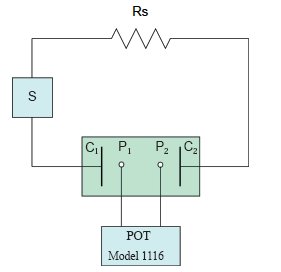 S:constant-current power supply, POT:conductivity meter Model1116, RS:standard adjustable resistor, C1,C2:electrodes for current, P1,P2:electrodes for potential difference |
Conductivity Meters
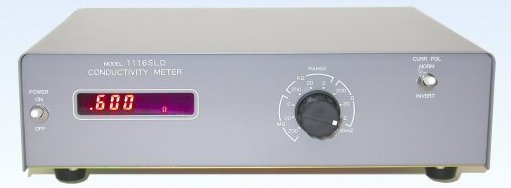
| Description | Model 1116 Conductivity Meter for Solution | Model 1116SLD Conductivity Meter for Solid |
| Catalog No. | 010437 | 010438 |
| Range of measurement | 2,000 / 200 / 20 / 2 mS (1KHz) | 200mΩ / 200 KΩ / 2 / 20 / 200 MΩ ( |
Our Conductivity Meters have high tolerance for external noise since op-amp and phase sensitive detector are equipped. Not only that the obtained value is shown their front panel digital display, but also that users can run serial measurement by rear output panel. Model 1116SLD is specialized for solid sample because solution is decomposed by its DC current whereas Model 1116 is capable of measuring liquid sample by AC method.
4-probes electrode for conductivity measurement
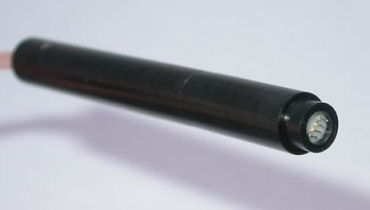
| Catalog No. | Description |
| 010439 | 4-probes electrode for conductivity measurement |
Model 1116 SLD equips a cell cable with alligator clip as a standard
accessory, however we recommend to utilize our 4-probes electrode
for conductivity measurement in order to obtain accurate value. The
four electrodes steadily contact with the sample by 50gf of needle
pressure and rhodium plating strengthens their surface. There is no
need to replace entire electrodes if one of them became
dysfunctional - respective four electrodes can be replaced
seperately.
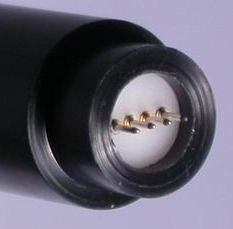 |
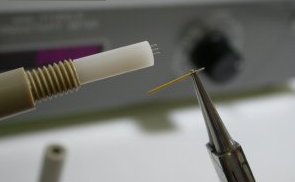 |
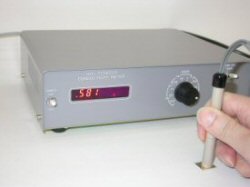 |
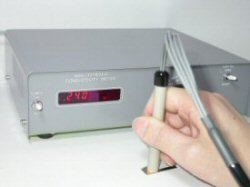 |
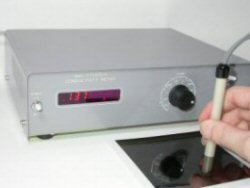 |
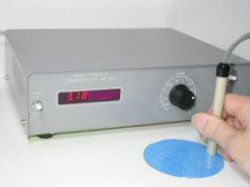 |
Example of Measuring Accuracy of Model1116 SLD
This table shows relation amang range, measuring current and
measuring accuracy.
| Range(Ω) | 200m | 2 | 20 | 200 | 2K | 20K | 200K | 2M | 20M | 200M |
| Measuring Current | 100mA | 10mA | 10mA | 10mA | 1mA | 100μA | 10μA | 1μA | 100nA | 10nA |
| Measuring Accuracy | 1% | 10% | 0.5% | 0.5% | 0.5% | 0.5% | 0.5% | 1% | 2% | 2% |
Conductivity electrode
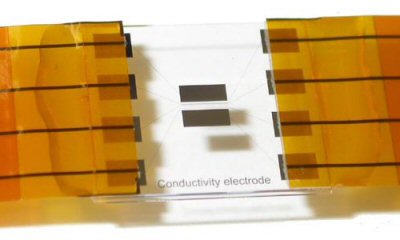
| Catalog No. | Description |
| 011315 | Conductivity electrode |
Platinum terminals are deposited on a fused quartz substrate as
current supplying electrodes and potential difference probing
electrodes. The distance between electrodes for potential difference
are adjustable from 40 Ám to 250 Ám by changing the connect pin.